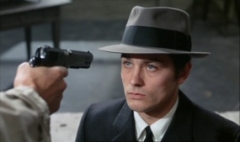Is It Really a Great Movie? Part Twenty-Seven: Le Samourai
by dan heaton
Using Roger Ebert's Great Movies book as a guide, this series of articles will focus on all films included on his list that previously have escaped my notice. Since all lists are subjective, I am not treating Ebert's choices as the essential selection of films. However, his essays offer the perfect chance for me to explore both classics and lesser-known pictures from around the globe.

Director Jean-Pierre Mehlville rose to prominence during the ‘60s and early ‘70s with a remarkable series of unique, modern pictures. Hailing from France, the talented filmmaker understood that sometimes spare dialogue and extended quiet was more valuable than bombast. His seminal films include 1955’s Bob le Flambeur, remade with Nick Nolte as The Good Thief, and 1970’s Le Cercle Rouge, which included one of cinema history’s great heist sequences. Released in 1967, Le Samourai made a star out of Alain Delon as the cool protagonist and continues to charm audiences with its smooth tone. Mehville’s original approach has inspired numerous films, including John Woo’s The Killer and Jim Jarmusch’s Ghost Dog: The Way of the Samurai. Both of these films utilize their directors’ unique style to create a much-different experience, but they owe a considerable debt to this memorable picture.
The story begins in a lonely room where we meet Jef Costello (Delon) – an unemotional hitman who appears resigned to a life of solitude. His professional demeanor and preparation convey Costello’s top-notch killing skills, but a critical mistake could lead to disaster. After shooting an unknown victim, he encounters the attractive jazz performer Natalie (Cathy Rosier) and allows her to live, which could seal his fate with the police. During a long night of interrogations, a wise police inspector (François Périer) rightly suspects Costello, but his proof is fleeting. Once he has been apprehended, the killer has lost face with his employers, so they also find him expendable. These conflicts lead to a series of brilliant cat-and-mouse chases between Costello, the cops, and the other criminals that consistently surprise. The climax makes sense when you consider each moment, but it still provides a quick shock. Will Natalie give him up to the police? Can Jeff avoid the cops and retain his professional standing? These questions and more are answered in one of the more entertaining films in this Great Movies series.
The professional hitman has been depicted in numerous films, and the basic plot is also fairly similar to other stories. The primary difference is Mehville’s confident directing, which keeps the images riveting even when little is happening. Nearly 10 minutes passes before we hear a single line of dialogue, and the action never drags. The best sequence involves Costello’s repeated efforts to avoid police tails aboard the Paris Metro. Quickly leaping out of doors and using misdirection to avoid numerous followers, his efforts help to deliver heart-pounding excitement. Mehlville never uses jarring music queues or quick cuts to heighten the intensity. Instead, we observe Costello’s efforts in lengthy shots that clearly identify his predicament. We see the police tails in the corners of the screen and marvel when the hitman eventually notices them. Another interesting element is our alignment with Costello, who has killed a man and displayed little emotion. Delon’s cool demeanor makes him a worthy figure, and we repeatedly hope for his safe escape.
Roger Ebert compares Mehlville to a painter or musician who can “suggest complete mastery with just a few strokes.” I totally agree with this description and can’t wait to explore more of the director’s work. Le Samourai gives him the chance to take a simple plot and add numerous layers. A more frenetic picture might have worked as a thriller, but it would have failed to inspire any lasting emotions. By showing us the missing elements of Costello’s drab existence, we’re drawn closer to his experience and become interested in his survival. The police might have good intentions and the criminals might be justified, but our feelings remain with the hitman. Costello isn’t even a particularly talented killer, and these missteps keep him from being a perfect machine like the Terminator, which enhances his audience standing. Mehlville’s extremely thin style delivers a much stronger experience that deserves to be called a Great Movie.
Copyright (c) 2007 erasing clouds |
|